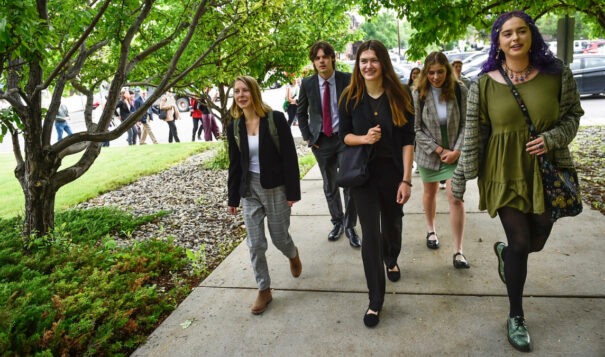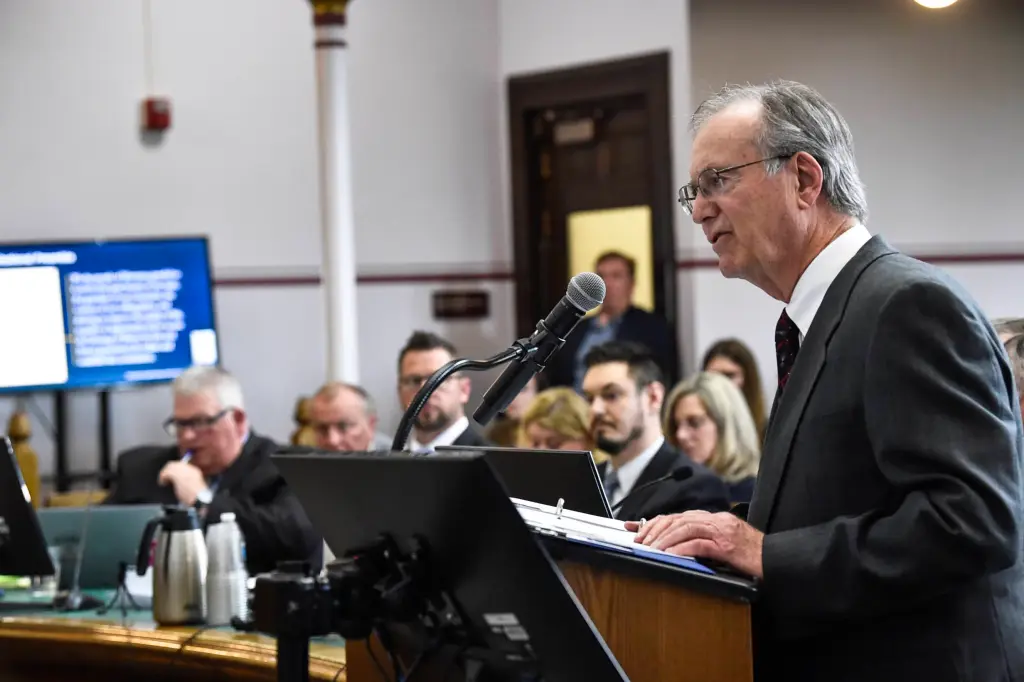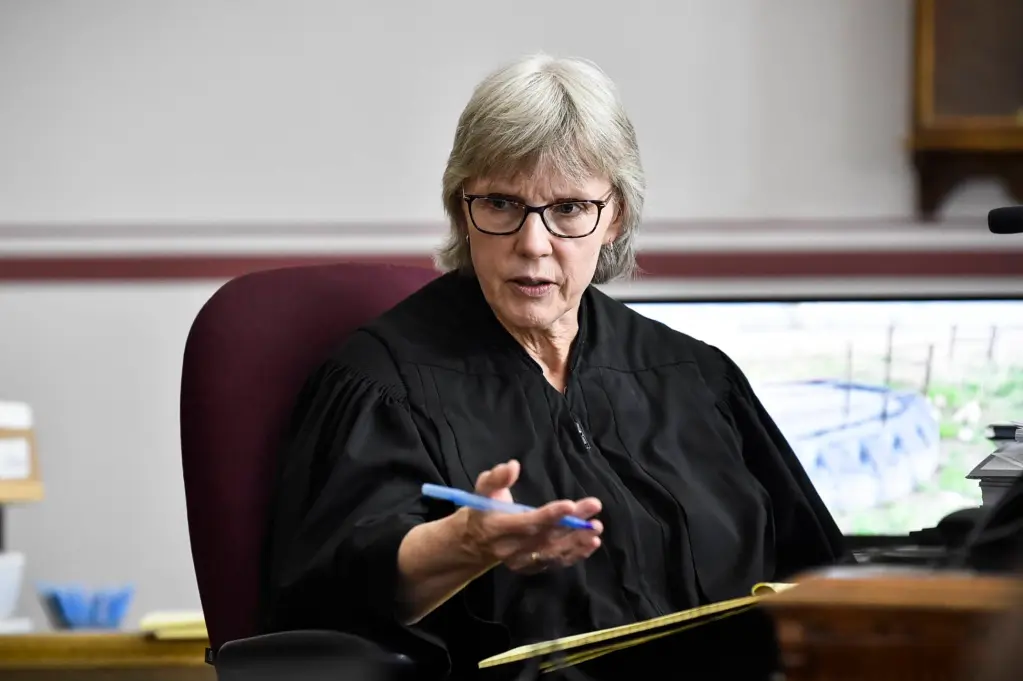News Based on facts, either observed and verified directly by the reporter, or reported and verified from knowledgeable sources.
Judge rules in favor of youth plaintiffs in Montana climate lawsuit
 Youth plaintiffs in the climate change lawsuit Held vs. Montana arrive at the Lewis and Clark County Courthouse on June 12, 2023, for the first day of hearings in the trial. Credit: Thom Bridge / Independent Record
Youth plaintiffs in the climate change lawsuit Held vs. Montana arrive at the Lewis and Clark County Courthouse on June 12, 2023, for the first day of hearings in the trial. Credit: Thom Bridge / Independent Record
Two months after the landmark environmental trial concluded, a judge has ruled the plaintiffs have a constitutional right to a clean and healthy environment. Montana’s attorney general will appeal the ruling.
A Montana district judge on Monday issued a ruling in the nation’s first constitutional climate change trial declaring the youth plaintiffs have a “fundamental constitutional right to a clean and healthful environment” while revoking two Montana statutes. The state attorney general’s office said it will appeal the ruling.
The 103-page order by Lewis and Clark District Court Judge Kathy Seeley comes two months after the landmark Held v. Montana trial took place in Helena, and explicitly states that Montana’s greenhouse gas emissions are “proven to be a substantial factor in causing climate impacts to Montana’s environment, and harm and injury to the youth plaintiffs.” It also rolls back two laws enacted by Montana’s Republican-led Legislature this year, House Bill 971 and Senate Bill 557, which made changes to the Montana Environmental Policy Act (MEPA).
“Plaintiffs have proven that as children and youth, they are disproportionately harmed by fossil fuel pollution and climate impacts,” the order states. “The Defendants have the authority under the statues by which they operate to protect Montana’s environment and natural resources, protect the health and safety of Montana’s youth, and alleviate and avoid climate impacts by limiting fossil fuel activities that occur in Montana when the MEPA analysis shows that those activities are resulting in degradation or other harms which violate the Montana Constitution,” the order continues.

The lawsuit, the first of its kind to reach trial, was filed by 16 youth plaintiffs from across Montana who alleged the state violated their constitutional right to a clean and healthful environment by promoting the fossil fuel industry and exacerbating climate change.
“As youth, we are exposed to a lot of knowledge about climate change. We can’t keep passing it on to the next generation when we’re being told about all the impacts that are already happening,” Rikki Held, the suit’s lead plaintiff, told the Flathead Beacon before the trial. “In some ways, our generation feels a lot of pressure, kind of a burden, to make something happen because it’s our lives that are at risk.”
The complaint focused on a provision in MEPA that prohibits state agencies from considering greenhouse gas emissions and climate change impacts while conducting environmental reviews.
Seeley’s ruling declared that portion of MEPA unconstitutional, as well as a section enacted by SB 557 requiring groups challenging state permitting actions to post a bond before filing a lawsuit and to seek a preliminary injunction, a tough-to-meet legal standard that would immediately halt a project.

“We’re very pleased with the ruling,” Roger Sullivan, a Kalispell-based attorney for the plaintiffs, told the Beacon Monday. “It is stunning in its scope, and I think that the message from the judicial branch is very clear. The task will now be for the executive branch of our state government and the Legislature to abide by this order.”
In a statement, Julia Olson, executive director of the Oregon-based law firm Our Children’s Trust, which brought the suit on behalf of the plaintiffs, called the ruling a “huge win for Montana, for youth, for democracy, and for our climate.”
“For the first time in U.S. history, a court ruled on the merits of a case that the government violated the constitutional rights of children through laws and actions that promote fossil fuels, ignore climate change, and disproportionately imperil young people,” Olson said in a prepared statement. “As fires rage in the West, fueled by fossil fuel pollution, today’s ruling in Montana is a game-changer that marks a turning point in this generation’s efforts to save the planet from the devastating effects of human-caused climate chaos.”
Olson said the ruling provides an evidentiary record and legal precedent that will influence future climate-related lawsuits. The Sabin Center for Climate Change Law currently tracks 2,424 climate-change related legal cases in the world, 1,591 of which are filed in U.S. jurisdictions, including two upcoming Our Children’s Trust trials. Next summer, a youth-led climate case against the Hawaii Department of Transportation will proceed to trial, while a federal judge ruled earlier this summer that Juliana v. United States is also cleared for trial.
Attorneys with the Western Environmental Law Center (WELC), which served as co-counsel for the plaintiffs, said Seeley’s ruling “underscores the reality that Montana’s government is actively working to undermine our constitutional right to a clean and healthful environment.”
“Judge Seeley’s decision comes at a time when we’re seeing the impacts of climate change accelerate — from low streamflows and lake levels to unprecedented heat waves, floods, and wildfires,” according to a prepared statement by Melissa Hornbein, senior attorney with WELC. “These are the climate realities the youth plaintiffs and expert witnesses told us about on the stand, while the state disclaimed any responsibility and dismissed them. We’re relieved that the court recognized that these youth plaintiffs are already feeling the impacts of the climate crisis, as well as the dangers threatening their future if the state doesn’t take meaningful action to address it.”
Much of the landmark trial that unfolded over seven days in June centered on the connection between Montana’s warming climate and the harm alleged by the plaintiffs, who testified that their constitutional right to a “clean and healthful environment” has been violated by the state’s practice of promoting and permitting the fossil fuel industry, thereby contributing to climate change through greenhouse gas emissions.
Attorneys for the plaintiffs spent five days of the trial calling on expert witnesses — including leading climate scientists, glaciologists, policy experts and mental health professionals — to describe the harms the plaintiffs say they have suffered because of Montana’s promotion and permitting of the fossil fuel industry. Ten of the young plaintiffs, ranging in age from 14 to 22, also took the stand to describe how their quality of life has been compromised by both the real-time effects of climate change and its impending impacts.
The state, meanwhile, disputed the evidence that burning fossil fuels contributes to climate change in a meaningful way, and denied that Montana’s increasingly severe wildland fire seasons and drought are linked to its legacy of supporting fossil-fuel burning projects reliant on coal, oil and gas.
The entirety of the state’s defense spanned less than one full day of trial, compared to the five days during which plaintiffs’ attorneys called witnesses. The defense called just one expert witness, an economist, whose testimony Seeley said “was not well-supported, contained errors, and was not given weight by the Court.”
Seeley’s ruling states that Montana’s constitutional right to a clean and healthful environment includes climate, and affirms the connection between greenhouse gas emissions, climate change and harm to Montana’s youth.
The court also found that allowing the state to consider climate change in permitting questions “would provide the clear information needed to conform their decision-making to the best science and their constitutional duties and constraints and give them the necessary information to deny permits for fossil fuel activities when inconsistent with protecting Plaintiffs’ constitutional rights.”
Emily Flower, a spokesperson for the attorney general’s office, called the ruling “absurd” and described the trial as a “tax-payer funded publicity stunt” in a statement. “The State will appeal,” she said.
This article is part of a series on the youth-led constitutional climate change lawsuit Held v. Montana. The rest of the series can be read at mtclimatecase.flatheadbeacon.com. This project is produced by the Flathead Beacon newsroom, in collaboration with Montana Free Press, and is supported by the MIT Environmental Solutions Journalism Fellowship.
